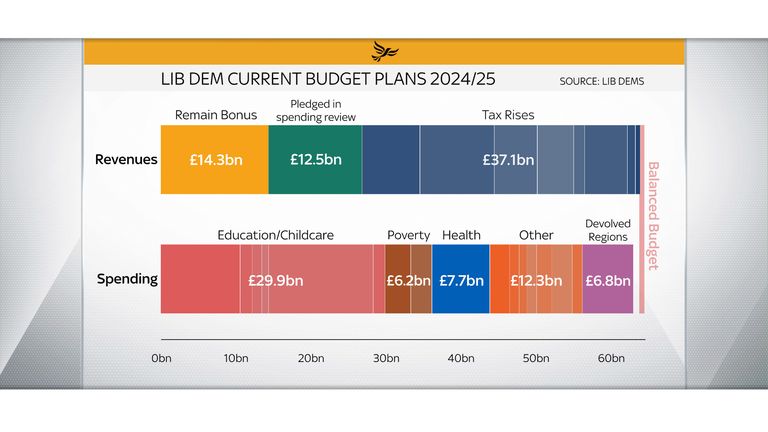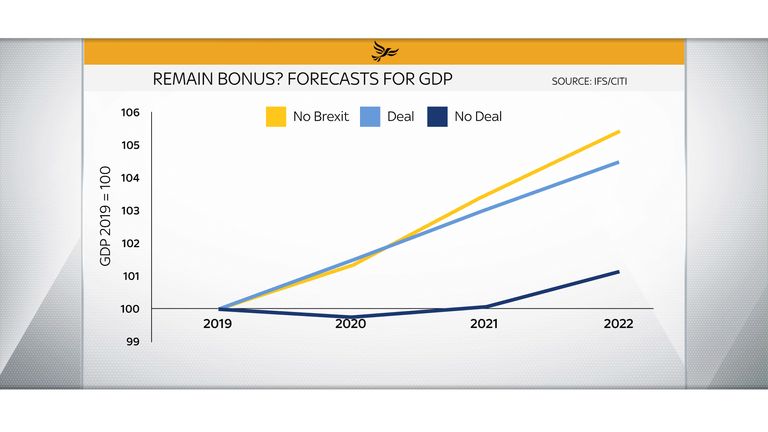Liberal Democrat manifesto plans are less generous than they look
When you dig through the numbers behind the Liberal Democrat manifesto (and the party is to be commended for actually publishing its workings), two things immediately catch the eye.
The first is the whopping amount the party wants to spend in the coming years – an eye-watering sum of £62.9bn extra a year on the current budget by the end of the parliamentary term.
It would amount to one of the most dramatic increases in spending in modern history and includes all sorts of goodies, most notably a new “universal childcare” scheme which costs £14bn a year.
And bear in mind this is on top of the extra £130bn or so that the party wants to spend on infrastructure investment on roads, rail and so on.
That brings me to the second striking thing: the fact that somehow the LibDems intend to finance this increase in current spending – every single penny of it – without increasing government borrowing.
How on earth do they do that?
The short answer is a combination of big tax rises and rather odd economic jiggery-pokery.
Let’s deal with those tax rises first of all.
They are all pretty hefty: a penny on the basic rate of income tax (that’s a long-standing Lib Dem policy), some big changes to capital gains tax so the tax-free allowance disappears, an increase in corporation tax and some other odds and ends including a big air passenger duty increase and even duties on legalised cannabis.
So far so straightforward: spending out, taxes in.
That is how these manifestos tend to work.
But those tax rises only finance just over half of the new spending.
What is it that accounts for the rest of the revenue – about £27bn?
Well, half of it comes from the much-discussed “remain bonus”.
The Lib Dems say that the economy will grow more quickly if the UK doesn’t leave the European Union.
That higher economic growth equals higher incomes which equals higher tax revenues.
The Lib Dems think that could bring in more than £14bn a year by the final year of the parliamentary term.
That seems to be in line with what economists are saying, but it’s worth bearing in mind two provisos.
The first is that this windfall is based on an economic forecast.
Economic forecasts are inherently risky things – far more probabilistic than the other numbers on the Lib Dem manifesto.
So there is a chance the bonus doesn’t come in.
Likewise there is a chance it ends up being more than expected.
It is odd that the Lib Dems are inserting this chunk of revenues into their fiscal numbers, but not half as odd as the other big revenue item.
For it turns out a rather big chunk of the “revenues” the Lib Dems are relying on to finance their big spending plans are not revenues at all but cancelled spending plans.
In short, the Lib Dems are planning to ditch the Tories’ 2019 spending round pledges from earlier this year – you know the stuff about extra NHS spending and 20,000 police officers – and replacing them with their own proposals.
In other words, the billion pounds or so the Lib Dems are planning to spend on police officers is simply a recycled version of the billion pounds that’s already set aside for police officers.
The Lib Dem spending on defence actually looks even lower than the existing spending plans instituted by the Conservative government.
The health spending looks like it exceeds the existing health spending plans but it’s not entirely clear by how much.
In other words, while the Lib Dem plans look exceedingly generous, the reality is that they are rather less generous than they actually look.
To be precise: one in every five pounds the Lib Dems say they’re spending is not new money; it’s already been promised by the Tories.
Now, this might seem like splitting hairs, but it is a rather odd feature of a manifesto which makes much of the fact that the party wants to depict themselves as the party of fiscal probity.
Instead, it looks as if they’ve included a couple of clever tricks in their numbers to give the impression that they are somehow able to spend massive amounts without having to borrow a single penny.
Campaign Check scrutinises election claims made by political parties, examining if they are true or false, and the context. Sky News is working with Full Fact – the leading independent fact-checking charity.
The Brexit Election on Sky News – the fastest results and in-depth analysis on mobile, TV and radio.
- Watch Dermot Murnaghan live from 9pm on 12 December
- See the exit poll at 10pm
- Watch KayBurley@Breakfast election special on 13 December
- Find out what happens next in All Out Politics special from 9am with Adam Boulton
Source: Read Full Article




